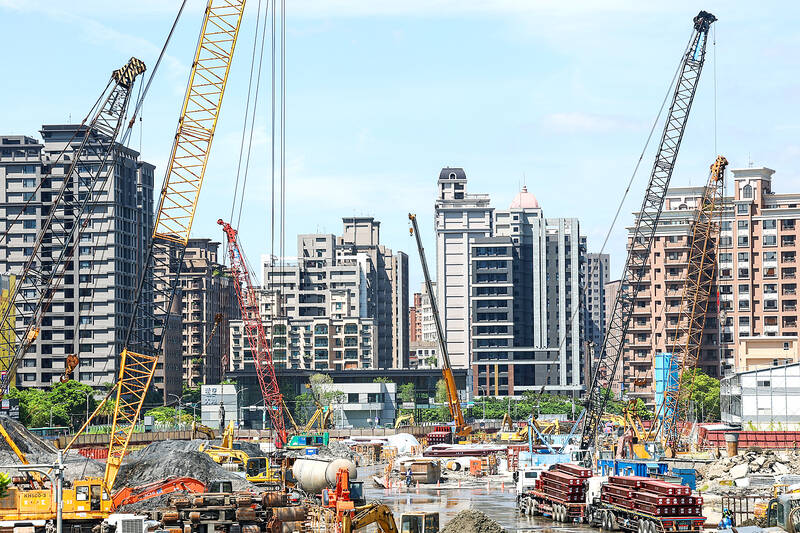Taiwan’s property market breathed a sigh of relief after the central bank on Thursday kept interest rates unchanged for the second straight quarter without introducing fresh credit controls, analysts said yesterday.
Property transactions dropped after the central bank raised interest rates five times between March last year and March this year, Great Home Realty Co (大家房屋) research head Mandy Lang (郎美囡) said.
The downtrend persisted in June this year when the central bank halted rate hikes, but tightened lending terms on second-home mortgages to prevent funds from overflowing to real estate and threatening the nation’s financial stability.

Photo: CNA
“The market must remain cautious as the central bank made clear it will pay close attention to signs of resurgence of property fever,” Lang said.
Previous measures have succeeded in cooling the property market in light of slowdowns in property transactions and housing prices, as well as mortgage and construction loans, central bank Governor Yang Chin-long (楊金龍) said.
Monthly property deals exceeded 30,000 before the first rate hike in March of last year and declined to 16,657 in January this year, as buyers largely stayed on the sidelines to avoid overleveraging, Lang said.
Apart from rate hikes and credit controls, the government increased property taxes, banned transfers of presale housing purchase agreements and stiffened punishments for unfair advertising practices.
H&B Realty Co (住商不動產) chief researcher Jessica Hsu (徐佳馨) said the property market no longer appears to be the central bank’s top concern after consumer prices eased to nearly the 2 percent target.
“The monetary policymaker now seems to care more about the economy and put the property market on its watch list,” Hsu said.
The change by no means indicates the government would turn a blind eye, Hsu said, adding that the Cabinet on Thursday gave its go-ahead to plans to raise house taxes on multiple home owners to discourage house hoarding.
The proposed tax revisions would lower house taxes on first self-occupied homes to a flat 1 percent and raise the charges on multiple houses to a maximum of 4.8 percent. The adjustments could generate an extra NT$4.57 billion to NT$5.57 billion (US$142.3 million to US$173.4 million) in house taxes per year after the bill goes into practice in July next year, the Ministry of Finance said.
Taichung-based Shining Building Business Co (鄉林建設) yesterday said it is not right to add tax burdens on unsold houses as developers are house suppliers, not house owners.
Developers would have no choice but to pass extra taxes on to home buyers, Shining chairman Lai Cheng-yi (賴正鎰) said.

Semiconductor business between Taiwan and the US is a “win-win” model for both sides given the high level of complementarity, the government said yesterday responding to tariff threats from US President Donald Trump. Home to the world’s largest contract chipmaker, Taiwan Semiconductor Manufacturing Co (TSMC, 台積電), Taiwan is a key link in the global technology supply chain for companies such as Apple Inc and Nvidia Corp. Trump said on Monday he plans to impose tariffs on imported chips, pharmaceuticals and steel in an effort to get the producers to make them in the US. “Taiwan and the US semiconductor and other technology industries

SMALL AND EFFICIENT: The Chinese AI app’s initial success has spurred worries in the US that its tech giants’ massive AI spending needs re-evaluation, a market strategist said Chinese artificial intelligence (AI) start-up DeepSeek’s (深度求索) eponymous AI assistant rocketed to the top of Apple Inc’s iPhone download charts, stirring doubts in Silicon Valley about the strength of the US’ technological dominance. The app’s underlying AI model is widely seen as competitive with OpenAI and Meta Platforms Inc’s latest. Its claim that it cost much less to train and develop triggered share moves across Asia’s supply chain. Chinese tech firms linked to DeepSeek, such as Iflytek Co (科大訊飛), surged yesterday, while chipmaking tool makers like Advantest Corp slumped on the potential threat to demand for Nvidia Corp’s AI accelerators. US stock

The US Federal Reserve is expected to announce a pause in rate cuts on Wednesday, as policymakers look to continue tackling inflation under close and vocal scrutiny from US President Donald Trump. The Fed cut its key lending rate by a full percentage point in the final four months of last year and indicated it would move more cautiously going forward amid an uptick in inflation away from its long-term target of 2 percent. “I think they will do nothing, and I think they should do nothing,” Federal Reserve Bank of St Louis former president Jim Bullard said. “I think the

SUBSIDIES: The nominee for commerce secretary indicated the Trump administration wants to put its stamp on the plan, but not unravel it entirely US President Donald Trump’s pick to lead the agency in charge of a US$52 billion semiconductor subsidy program declined to give it unqualified support, raising questions about the disbursement of funds to companies like Intel Corp and Taiwan Semiconductor Manufacturing Co (台積電). “I can’t say that I can honor something I haven’t read,” Howard Lutnick, Trump’s nominee for commerce secretary, said of the binding CHIPS and Science Act awards in a confirmation hearing on Wednesday. “To the extent monies have been disbursed, I would commit to rigorously enforcing documents that have been signed by those companies to make sure we get